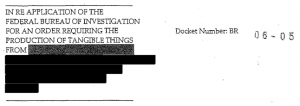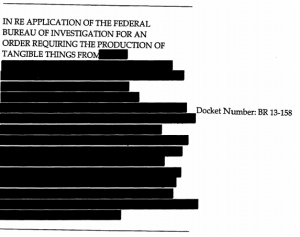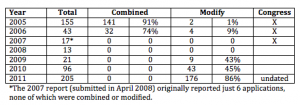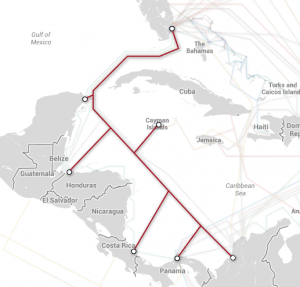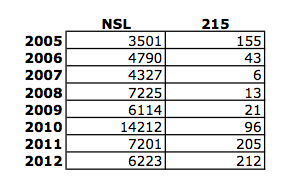Unread Reports as the Big Data Dump? Not Really.
The very same week the President released his breathless report on Big! Data!, the Washington Post has a story criticizing the sheer number and types of reports Congress requires from the Federal bureaucracy.
It started out with a good idea. Legislators wanted to know more about the bureaucracy working beneath them. So they turned to a tool as old as bureaucracy itself — the interoffice memo. They asked agencies to send in written reports about specific things they were doing.
Then, as happens in government, that good idea was overused until it became a bad one.
[snip]
But as the numbers got bigger, Congress started to lose track. It overwhelmed itself. Today, Congress is not even sure how many of those 4,291 reports are actually turned in. And it does not try to save copies of all the ones that are.
So some agencies cheat and send in nothing. And others waste time and money sending in reports — such as the one on dog and cat fur — that simply disappear into the void.
To support its case, WaPo focuses on one report requiring Customs and Border Patrol to report on how much dog and cat fur products are being shipped into the US, which is probably a needless report (which is also probably why WaPo picked it out of the 4,291 it identified).
And WaPo — a member of the Fourth Estate that purportedly serves as a check on power — comes to this very dangerous conclusion.
The problem is that there is no system to sort the good ones from the useless ones. They all flow in together, which makes it hard for congressional staffers to spot any valuable information hidden in the flood.
First, the press is part of that system! Rather than throwing cat and dog fur, perhaps WaPo could have tried to distinguish those that were critical from those that are questionable and those that are clearly frivolous.
Moreover, it is the height of irresponsibility to absolve Congressional staffers — whose bosses are the only ones that can eliminate useless reports — of responsibility for reading the reports they get. Either the staffers must be held accountable for reading the reports, or for eliminating them. That’s how you fix the system. That’s why we’re paying them.
Ultimately, too, I’m not sure I buy the WaPo’s argument that these are useless reports. 4,291 seems like a not unreasonable amount of data for legislators to receive and read about the world’s biggest (perhaps now second biggest) economy, about DOD’s $526 billion budget, about the many federal benefit programs, about the expanding police state.
And if you look at the actual list (rather than WaPo’s admittedly snazzy but not very informative infographic on them), many — perhaps even most — of the reports make a lot of sense.
Consider the reports listed for General Services Administration, an entity with an annual budget of $26 billion, which has the ability to effect great change as the source of enormous spending, and one that has routinely experienced significant spending scandals.
- Activities and status of advisory committees in existence during the previous calendar year
- A report on the status of the high-performance green building initiatives under this subtitle
- Administration’s alternative fueled vehicle program
- A description of lost opportunities for waste-heat recovery from the project described in paragraph (A)
- A report on the use of photovoltaic energy in public buildings
- Violations by Federal agencies of Federal Records Act of 1950, as codified 1950
- Reports by Inspector General of particularly serious or flagrant problems, abuses, or deficiencies in the administration of programs and operations of the agency
- Activities of the Inspector General
- Accessibility to public buildings by the physically handicapped
- Prospectus proposing a building project or lease
- Location, space, cost, and status of each public building, the construction, alteration, or acquisition of which is to be under authority of the Act, and which was uncompleted as of the date requested
- Building project surveys as requested by either the Senate or House
- Use of underutilized public buildings and property for facilities to assist the homeless
- Summary of excess property disposal reports
- Evaluation of the operation of programs for donation of Federal surplus personal property; excess personal property transferred
- Excessive stocking of property, above reasonable inventory levels, by executive agencies
- Administration of the Federal Property and Administrative Services Act of 1949
- Contracts to facilitate the national defense entered into, amended, or modified
- Acquisition cost of surplus real or related personal property conveyed for care or rehabilitation of criminal offenders during previous fiscal year
- Results of investigations of the cost of travel and the operation of privately owned vehicles to Federal employees while engaged in official business
- Annual determination of the average actual cost per mile for the use of a privately owned motorcycle, automobile, and airplane
- A plan to comply with Section 432 relating to energy and water conservation at General Services Administration facilities
Reports 1, 6, 7, 8, 10, 11, 12, 17, and 18 are simply reports Congress needs to ask for to ensure there’s some visibility into the Agency, to ensure they’ll be informed if GSA finds something wrong itself. Reports 2, 3, 4, 5, 9, 13, 14, 19, and 22 measure the efficacy of efforts to use GSA’s buying power to do some social good (and report 9, on ADA accessibility, involves significant legal compliance). Reports 15 and 16 address an area susceptible to graft. Reports 20 and 21 are not only key to cost-benefit analysis of how Federal employees travel, but they apparently are tied to one of GSA’s most requested links. Some of these are also reports tied to an action, like buying a building. And all that amounts to less than 1 report for every $ billion American taxpayers give to GSA. If anything, there are a few more reports — that might identify obviously politicized or excessive spending, which is a persistent problem with GSA — that are missing.
Admittedly, that’s just one random agency. But aside from some entities the Federal government runs itself (like American Samoa and DC) as well as some Commissions over which there have been political fights in the past I’m not seeing a whole lot of waste here — though there may be some inefficiency in how the information is requested. I might grant that in the era of big data we need to automate this — in effect, give Congress a better way to Big! Data! the bureaucracies it oversees (though that would be awfully susceptible to abuse), but I don’t see a lot of information that shouldn’t be required from the bureaucracy.
I’m reminded how, 2 years ago, James Clapper claimed ODNI had to produce too many reports and should be permitted to eliminate 30 of them. He tried to get rid of the annual report on how many people have security clearance (one of the few ways we can measure the ballooning secret government). He tried to get rid of reports on Department of Homeland Security’s notoriously useless intelligence agency. He tried to eliminate reports on Chinese spying on the US and nuclear lab security, both persistent security issues. He tried to eliminate a report informing Congress what the privacy staffs of intelligence agencies are doing. In short, in the guise of onerous reporting, he tried to eliminate crucial oversight (as well as a paper trail that could be FOIAed) on several areas of great public concern.
Or consider this: DOD cannot pass an audit. The biggest military in the world still is not required to account for the money it spends, both to itself and Congress.
And yet a newspaper is saying we require too much reporting from the great big bureaucracy?
I don’t buy it.

